Amy has been in an open adoption for a long time as first mom to Addie, born and relinquished in 1985. Amy’s reflection on the past 30 years highlights my hunch that even if you’ve got contact with your child’s other parents, there are so many other facets to consider in helping your child process her adoptedness and integrate her parts.
In fact, if you have contact between families but are not also parenting with mindfulness and attunement, you may be inviting in complexity (contact) without having ways to deal with such complexity (mindfulness and intentionality).
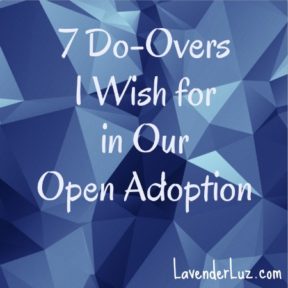
Amy’s points challenge me; they might do so for you, too. My suggestion is not to take Amy’s narrative personally. She is not commenting on or judging anyone’s adoption arrangement other than her own. If any of her points trigger you, stop for a moment to see if you can figure out why.
Amy’s Story
I have been involved in a semi/fully open adoption since 1985. Being that open adoptions were quite rare back in those days, there was precious little information or guidance to help people navigate these undefined relationships. The Internet didn’t exist, and stories of other people’s experiences simply couldn’t be found. Of course the adoption agency had no prior situations like ours, so there was nothing to measure against. We did the best we could, but it hasn’t turned out so positively…for any of us.
Of course, my biggest regret is that circumstances didn’t allow for me to parent my daughter. Aside from that, here are 7 things I wish we’d done differently in our open adoption.
#1 Be Better Prepared
First let me say, an open adoption isn’t going to cure all of adoptions ills. In my view, birth parents still hurt, adoptees still hurt and can be confused. Not confused as in who their parents are, but confused by emotions and why things are as they are. The grown ups, adoptive and birth parents, make a plan for the baby at a time when the baby’s temperament is unknown. Will this child be able to handle such a complex situation? Will this child be hard-wired to thrive in such an arrangement, or will she perhaps be terribly conflicted and confused and have a very difficult time understanding and processing it?
The latter is, what I believe, happened for our Addie. And none of us were prepared to help her.
And that’s the first thing I’d do differently, though it wasn’t possible back then. I wish we’d been better prepared for what we’d each experience in our open adoption…especially what Addie might experience.
Addie’s adoptive parents took things from semi to fully open when she was 8. Her adoptive brother is 4 years older than she is, and they had just introduced him to his birth mother and older siblings. Addie was feeling left out, so they decided to do the same for her. I’m not sure they took into account her emotional set point. They were just aiming to keep her situation equal to her brother’s. In hindsight, I wish they’d customized their decisions for each of their children.
#2: Know that Timing of First Contact is Key
If I were to do it over again, I would definitely wait until my daughter was old enough to have a bit more control and understanding of things. Either integrate families from the start, before the adoptee can remember a time when the birth parents weren’t involved, or wait until they’re older and have some input about it.
At age 8 through about 11*, children want to be like their peers, and don’t want to stand out as “different.” They begin to piece together that in order to have been adopted, they were first “given up” by their birth families. I know this brought grief to my birth daughter, and she would cry all the way home after visiting with us.
Her mom told us it would take a couple of days for her to get back to normal. Looking back, I think we were asking too much of a child who was completely unprepared to handle what she was feeling. And we were ill-equipped to help her. I believe remaining in a semi-open situation would have been better until she was in her teens. I define semi-open as letters, pictures, occasional phone calls, and gifts. Forcing visits, as wanted as they seemed to be by my daughter, caused big emotions, among them grief.
#3 Talk about Roles
I firmly believe that good counseling for all parties is crucial to a successful outcome in an open adoption for the times when big emotions arise. The relationships are undefined, and it’s very easy to cross boundaries, or for the birth family to be confused and unclear on what their part is in this uncharted relationship. We know what the role of grandparents are…what an aunt or uncle will be in a child’s life. But a “birth”mom or “birth”dad? What does that mean? I struggled with it then and struggle with it now. Who was I? What was MY part? I was told by Addie’s adoptive mom that I wasn’t her “real mother.” To this day I don’t know where I fit in. Most importantly, the adoptee needs to have someone to confide in and get guidance from — without being fearful of hurting one or the other party’s feelings.
#4 Have Access to Adoption-Competent Therapists
My daughter confided in me things that I now know I should have shared with her adoptive parents. Not wanting to break her trust or hurt her parent’s feelings, I kept them to myself. She needed help, and although I tried my best, I had a vested interest and a bias. A good therapist with knowledge of adoption issues could have gone a long way in helping my daughter untangle her confusion and help her process her grief. Why no one thought of it, I have no idea. Her mom continued to believe everything was going perfectly, and we had the fairy tale adoption situation.
And just what was the “fairy tale” situation? My daughter’s birth father and I got married and had the first of 6 children just 21 months after she was born. I was forced to give up my daughter and being only 17, I gave in to the powers that be. Never having dealt with MY grief, I assumed that another baby would fill the void. So, when we reunited with our daughter, she saw an intact, “normal” family with her 4 little brothers (at that point) doing well. Addie was 10 when she and her mom visited us when my next-born daughter was only a month old. I remember my birth daughter acting so strangely! She followed her mom around like a puppy, even waiting outside the bathroom door when her mom was in there. Not like herself at all. She was clearly uncomfortable and withdrawn.
Years later, I would find out why. She said watching me with my daughters while they were babies made her wish I had done for her what I had done for them…especially when I rocked them. My heart shattered for her. Open adoption really needs ongoing pulse-monitoring and often access to outside support.
#5 Be Honest with Yourself & Others from the Start
Through the years, we would never let on to Addie’s adoptive parents how excruciatingly painful visits with her were. I pretended, and apparently very well, that we were all just fine. We were secretly dealing with our “kept” children’s confusion and grief as well as our own. I was in and out of counseling, but never found a successful way to deal with everything. We didn’t confide in the adoptive parents because first of all, we didn’t think it was their problem. We also didn’t want them to think we were unstable and therefore a bad influence on our birth daughter. When I finally felt safe enough to let it out in a letter (Addie was 18 then) it had a detrimental effect on our relationship with the adoptive parents.
Addie’s mom had wanted to “go public” with how wonderful our open adoption had been, and how we had all turned out “just fine.” We weren’t all “just fine” and I had to finally let her know. With the help of my then-therapist, I wrote a long letter to Addie’s parents, thanking them for allowing us to be a part of their lives and how we loved them, but finally being honest about how hard it had been throughout the years. I thought it was a heart-felt, non-attacking letter (my therapist did as well) but it was very poorly received. I thought it would open the door wider to communication with them, but instead it did the opposite. Addie’s mom shut down, and didn’t even acknowledge the letter for months. I knew from Addie that they received it, and had completely gotten the wrong message from what I was trying to say. I can see now how it looked like a bomb dropped out of nowhere, shattering what they thought was a harmonious, successful arrangement. I still don’t regret being truthful, but clearly I should have been more honest from the start.
Perhaps it was a no-win situation no matter how I would have handled it. Maybe the bottom line was that I never wanted to give my daughter up in the first place. Nothing would have satisfied me. Should I have been honest about that? Rewind back to when opening up the adoption was first suggested…I should have been truthful then, and admitted and accepted that I wasn’t in a healthy place to be a good participant. I just wanted to see and touch my child.
Fast forward to today…Addie isn’t speaking to me. She has poor coping and communication skills. I believe that she has been doing what I did through the years…holding everything inside so as not to “rock the boat” or hurt either set of parent’s feelings. I’ve upset her, and her typical response is the silent treatment…sometimes for months. We’re headed to the fourth extended silent treatment right now. I’ve reached out to her, apologized profusely, and now I will back off because it is apparent she doesn’t want to hear from me. When she’s mad at me, she holds it against her birth dad and siblings as well.
#6 Be Careful with and Attentive to Developing Sibling Relationships
Which brings me to another element I would change…I wouldn’t foster the “brother/sister” or “big sister” role between Addie and the “kept” kids. For us, it set up expectations that were rarely met and caused hurt feelings and resentments.
I would let the relationships develop without assigning labels or specific roles. For example, Addie’s mom always played up the fact that Addie got to play “big sister” while with us and “little sister” in their family. From what I’ve siphoned out of comments Addie made over the years, she had no idea how to play the big sister role and felt pressured to do so. Addie’s close to neither her adoptive brother she grew up with nor with her full-biological siblings she saw only once or twice a year for a week or so at a time. I was naive to think that time together, without guidance in establishing relationships, might have brought them close.
I see now I was trying to minimize the losses for all my kids, and I failed. We were all in over our heads. Again, a therapist who has navigated such situations would have been helpful to us.
#7 Be Open to Changing Strategies at Different Stages
To sum all of this up, my suggestion is strong communication through therapy with all involved. Little things come up, which could turn into big things if not handled or managed properly. The situation may require more or less birth parent involvement at different times of the child’s development. It will be better received and less “personal” if a therapist is the one helping to guide the journey. We can sure think we know what we’re doing at the time, only to find out later that we messed up BIG.
With the issues already being present just by being relinquished, with the issues caused by losing a child whether voluntary or not, with issues possibly still remaining from infertility…you’re potentially dealing with wounded individuals all the way around. It’s a delicate situation that can leave little room for error. Give yourself and the child the best possible chance for success and seek help and guidance from a professional. Please don’t be afraid to do so.
* Please note I am not a psychologist or therapist. And I’m using a pseudonym for my daughter.
Guest poster Amy is first mom to Addie, wife of her retired Air Force husband for almost 29 years, mom to 6 parented children, and now Grandma/Mimi to 3. She’s been knee-deep in adoption issues since 1985 and more than once has wished she could have a do-over.
~~~~~

I present Amy’s account because I think it’s helpful to explore the ambiguities of open adoption and not get too comfortable in knowing definitively what a thing is. (I suspect that something so complex is closer to infinite than to definite.) Our kids need us to continually reassess and respond to their unique situations with mindfulness and oft-refreshed clarity.
Dear Readers, what say you?
~~~
About this Open Adoption Advice Column
- I may occasionally call on others to help with answers, to tap into group wisdom.
- I am not trained as a therapist. Please do not rely on words in this space to make your own major or minor decisions.
- Readers are encouraged to weigh in thoughtfully and respectfully. I ask everyone to remember that this is a teaching endeavor rather than a shaming endeavor, and that we aim to bring light rather than heat. It’s my belief that people do the best they can with what they have to work with, and our goal is to give folks more to work with.
Send in your own open adoption question. I’ll either offer an answer or find someone who can address your issue.
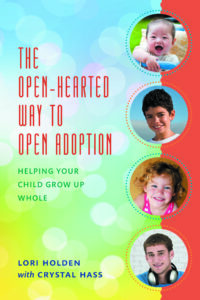
Lori Holden, mom of a young adult daughter and a young adult son, writes from Denver. She was honored as an Angel in Adoption® by the Congressional Coalition on Adoption Institute.
Her first book, The Open-Hearted Way to Open Adoption: Helping Your Child Grow Up Whole, makes a thoughtful anytime gift for the adoptive families in your life. Her second book, Standing Room Only: How to Be THAT Yoga Teacher is now available in paperback, and her third book, Adoption Unfiltered, is now available through your favorite bookseller!
Find Lori’s books on her Amazon Author page and catch episodes of Adoption: The Long View wherever you get your podcasts.

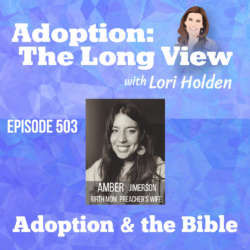
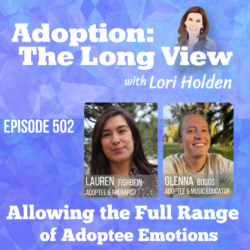
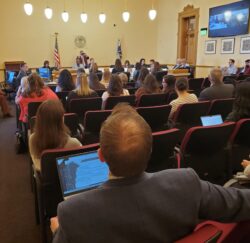
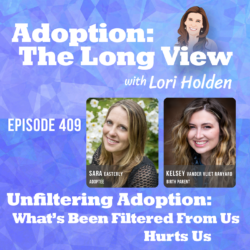

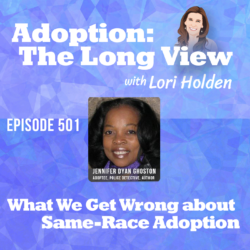

35 Responses
First off, thank you Amy for this honest and insightful post. You’ve given me a lot to think about, particularly in light of striving for an ideal.
One big theme that I came away with is recognizing there is no prescribed way to address the scars and emotions left from adoption. That it is ever changing and individual. The thing is, how best to address all of this, particularly when all the players involved may not be aware of how best to address the current situation? I absolutely agree that bottling things up and pretending everything is wonderful is not the way to go, but sometimes even the people at the center of an adoption don’t know what they need in that moment. And therapy can be seen as a stigma for some.
Hello Cristi! This blogging is all new to me, so hopefully everyone can bear with me lol 🙂
It’s all so individual. What is right in one person’s open adoption is not necessarily “right” for all. I think it requires vigilance, and lots of it. And a biggie…in my opinion, if you’re going to undertake a situation where a child’s feelings and future well-being may very well be at stake, get over the “stigma” of therapy. There is absolutely nothing wrong in seeking guidance in navigating what has the potential of being an emotional minefield if not handled properly. I sure wish we could have gotten professional help before we got to where we are now.
Thanks for your comment 🙂
Cristy – well said! It’s so hard to put into words what adoption has done to me and my family. If I had known what it would do to all involved – we never would have placed those who had no choice in this situation.
Adoption has been very traumatic for us. I honestly had no idea I was willingly signing my family up for trauma. With the adoption narrative that is shoved down our throats in America, why wouldn’t I? The religious narrative is even more convincing. From what I’ve seen, I don’t feel that narrative is helping anyone in the adoption triad. In my opinion, it unfairly places adoptive parents (mostly unbeknownst to them) in a position to control those most harmed by the trauma for years on end. More trauma ensues, because I believe in most instances they themselves don’t realize/know what impact their words/decisions/actions have on those with no power. I feel America encourages them to act as they do. I feel Adoptive parents are seen as heroes and placing/relinquishing parents are less than and deserving of this treatment – if they relinquish. I feel there’s such a sickness to that. No one should have that kind of power over my family and yet here we are. We allowed that trauma to walk right in and take residence. We allowed people into the most sacred, inner circle of our family and gave them power to continually hurt and harm us…unbeknownst to them.
If I had only known the truth…I would have chosen oh so very differently. Adoption is in need of a great overhaul, in my opinion. There has to be more transparency, adoptees have to have more rights, etc.
I’m grateful for people, like Lori, who are willing to allow these conversations to take place. I know they are not easy conversations to have. I wish adoption was practiced differently. Not sure that will ever happen, but I hope it does in my lifetime.
Please know I don’t say this to demonize any particular group – that is not my intent/heart. I just mean that this trauma thing is oh so very real and over and over and over again there is very little to no acknowledgement in what adoption practices can/could do to all in the triad.
If you are going to relinquish your rights to parent – you should have the right to know what you are fully/potentially getting yourself into…for years on end. That is the kind and compassionate thing to do for another human being and it’s not beyond us to make sure that can be accomplished. No one should be so desperate in adoption, that compassion/empathy/transparency goes out the window. Relinquishing parents should not have to find out the truth…months or years later by reading about it on the internet when they are in the throes of their deepest depression and seeking answers. There is no honor in that. No one would want to be treated that way.
We are all good people – all set up to practice adoption in a way that can be so harmful. I just don’t feel this should be.
I’m so sorry, Sheila, for the grief you’ve experienced.
This is so true: “No one should be so desperate in adoption, that compassion/empathy/transparency goes out the window.”
And I like how you acknowledge there are no angels or demons — just imperfect people working in a flawed system. I agree that we can try to set things up better.
Oh, yes! So much good stuff in this post! Much to process and check in about. Thank you!
Wow -that’s intense. So much in here.
“if you have contact between families but are not also parenting with mindfulness and attunement, you may be inviting in complexity (contact) without having ways to deal with such complexity (mindfulness and intentionality).” Superb advice; adoption is complicated for ALL involved.
And *that* is where I think OUR problem was…there was a fair to good amount of CONTACT, but lacked true “openness.” Somewhere along the way, our daughter STILL had/has very strong feelings of being conflicted between families. Addie has told me a few things that leads me to have a pretty good idea where it started.
Yep, this is all just the tip of the ice berg…as they say!
Two things – One – Thanks, Lori, for giving us Amy’s voice. I don’t read a lot on adoption, but when I do, it’s almost always from the adopting parents’ perspective. We need to hear from the birth parents, too.
Secondly, Amy, my sympathies on your experience, but I’m glad you had the courage to try. Without your effort and your willingness to be open about it, we would not know where the pitfalls are. Because Addie’s adoptive mom wanted everyone to believe it was all good, everyone ended up hurt, and possibly other families did, too. I understand the pressure to make something new and revolutionary work really well. But as you point out, there are better ways to do things and how else are you going to find out that you need a better way if you don’t fail (for lack of a better term). Thank you for your courage and ultimately, your encouragement.
Thank you, Anne. I wish I was coming from a place of courage, but most times, I feel anything *but* courageous! It’s been a very long time since I’ve spoken out. Last time I was actually in the throes of teen-agerhood with Addie!
I would like to hear more “open adoption” perspectives from adult adoptees who grew up in this situation. The few I’ve heard thus far have been pretty painful, but they grew up in a time before the internet was widely available, and the lack of information to help the parties involved was basically non-existent. With people like Lori educating the adoptive and “will -be adoptive” parents, and more adoptees lending their voices of experience, we can have the most emotionally healthy group of adopted people thus far! I think there will still be issues that are inherent with being relinquished. Unfortunately, there will ALWAYS be children who cannot be raised by their biological families. But with more awareness and education, we can recognize and hopefully neutralize the potentially damaging effects.
Hi Amy, As the old saying goes: hindsight is 20/20. Thank you for your honesty and sharing your on-going story with us. Here are some of my thoughts about your wishes for a do-over:
#1 Be better prepared – Anyone of a certain age can remember the silence and isolation of the pre-internet world, so it is easy to understand why it would have been difficult to find resources to educate all involved in Addie’s adoption. (Thank you, Lori, for helping to solve that problem.) With the resources available nowadays, there is simply no excuse for being oblivious to the predictable outcomes. No one knew what kind of person Addie would grow into or how she would respond to her situation. Frankly, I believe that is one of the inherent flaws of all adoptions–maybe even of ALL childrearing situations. So, I whole heartedly agree with your wish that decisions be customized and tailor-made to the child. And that requires that all the adults in an adoption pay attention, and most importantly, allow the adoptee control their own narrative.
#2 Timing of first contact – I think the error of your timing was waiting until Addie was 8. Your relationship existed before then; however, it was simply not acknowledged. I completely disagree that waiting until the teen years would have been better. To my way of thinking, that would be the worst possible moment to have first contact. There are just too many other things going on in the teenage mind to–surprise–add adoption into the mix.
#3 Talking about Roles – Of all the things that you’ve wished for this one calls out to me, so I’m surprised that you say very little about it. If Addie’s adopted mother told you that she was the “real mother,” you can be sure that she told Addie this too. With that one comment, she broke Addie into two artificial halves that do not add up to a healthy whole. She was being required to make an impossibly unfair choice. I can’t help noticing how many roles were imposed upon Addie: relinquished baby, adopted daughter, big sister, little sister. All of those roles appear to hinge upon what Addie would be for others. Who did Addie want to be? Why did her roles have to be named and thereby defined? Why was she even expected to fit herself into traditional roles? Adoptees simply have a bigger and more numerous family than non-adoptees; this is a completely predictable outcome of adoption. At its best, it can be a “constellation” of people joined by Addie. At its worst, it can be a “wreck-tangle” of ill-fitting and conflicting roles. So, go back to #1: be better prepared.
#4 Access to adoption-competent therapists – You say that the first time you met Addie, she was acting “strangely.” I would counter that she was acting logically and naturally to an illogical and unnatural situation. Frankly, it was the adults who were acting strangely: pretending that the situation was not confusing and not strange and expecting Addie to pretend too. Therefore, I applaud your insistence that adoption-competent therapy or other outside sources could have helped. As a child, did Addie ever meet another adoptee (other than her abrother)? Did she have anyone that could truly empathize with her situation? Now an adult and in the internet world, has Addie ever connected with other adoptees? One of the ubiquitous complaints of many adult adoptees is the very real dearth of adoption-competent therapists. Some therapists that claim to be adoption-competent are actually only well versed in the adoptive parents’ point of view. Even with the benefit of the internet, finding an adoptee-focused support group is quite a challenge. How do you find an adoption-competent therapist?
#5 Honesty – To fully accept the truth of adoption, the pretty fantasies have to die. Honesty can neatly slice through the hullabaloo and get to the core of truth–and that can be excruciatingly painful. For example: Today, Addie is giving you the silent treatment. If we believe that the mother-child bond exists, one of the first sensations that Addie felt as a newborn would have been the absence of her mother. You gave her “the silent treatment” first, and she learned that lesson well. I wonder why that surprises you. I’m not saying that to be cruel, but if you are ever going to understand Addie, you’ve got to see the world through her eyes.
#6 Sibling relationships – I don’t understand how this is different from #3.
#7 Adaptive Strategies – Wise advice. What works initially might not work as well later on. Addie will be adopted for the rest of her life. If she has children, like it or not, her adoption will color her mothering and be part of her children’s story too. The conversations about adoption should never end. And that requires that anyone touched by adoption can never stop being better prepared.
Hi Torrejon. As stinging as some of your reply was, I have no argument with anything you’ve said, or much defense to offer. The only correction I would make is that Addie’s behavior was “normal” at our first meeting, and subsequent meetings, until she was 10. It was her and amoms visit to our home when my “next born daughter” or “6th born child (including Addie)” was born that struck me as strange. Addie had been to that very home less than a year before, and was very comfortable with us. She even stayed several overnights while her aparents stayed in a hotel. It had something to do with me having a baby obviously. She clung to her amom and didn’t interact with me much at all.
You are 100% spot on with the “role definition.” We were trying to normalize the situation as much as possible. Our intentions were good, but you know what they say about the road to hell. I am trying to correct it now, but I can guarantee the aparents aren’t on board and choose to live with adoption issues being completely “in the past.” IMO, 12 years ago when Addie turned 18, that’s when it ended in their minds. Then she was an adult and could do what she wanted in regards to us. I don’t know if that makes sense, but with Addie becoming an “adult” and me sending my “truth reveal” letter, amom washed her hands of everything. A bit more to the story…when Addie was speaking to me back in about January/February of this year, she mentioned wanting to find someone for counseling. Not being in a position to pay for it herself, she entertained the idea of lying to her aparents as to why she needed to go…was going to say she was having a hard time adjusting to being back in college or something. I asked why she couldn’t just tell them the truth and her reply was that they would take it personally, and her amom would think she didn’t do a good enough job. Wow. I was always lead to believe amom was more open-minded than that. Addie then got involved in a new relationship, got mad at me, and I guess all her adoption issues got pushed to the back burner…for now.
Timing of opening the adoption…sorry! I think I’m skipping around but anyway…that wasn’t under our control. We should have declined, but I’m sure that would have been taken as rejection by Addie. Especially since her 12 year old brother had access to his birth-family. The teen-age idea may not be a good one either, but I have read of several adoptees who reunited with their birthfamilies in their teens and it worked out “okay.” Again, I think you have to evaluate the child’s emotional/mental state and what’s going on in his/her life when making this consideration. A few years back, I said something to Addie about opening the adoption when we did may have not been in her best interest, and maybe letting her make that decision when she was older would have been a better path to take. It hurt her feelings because she took it as we regretted knowing her during her growing up years. I explained that wasn’t the case, and that I felt it had hurt her, but I don’t know if she accepted that. I should have kept my mouth shut. Or should I have?
I agree with you whole-heartedly on the “real mom” thing too. Amom was relaying her conversation with Addie when she was probably 9 or 10. Addie had asked the age old adoptee question…who is my REAL mom? Amom’s reply which she proudly related to me…”I am! I’m the one who has taken care of you day to day…changed your diapers, wiped your nose, buys your clothes, etc.” Oh gosh…that hurt so bad. I never defended myself until I wrote her that letter much later. One of the tactics used by my social worker to get me to let my daughter go was the “if you really love this baby, you’ll give her to better equipped parents to raise. It’s what someone who really loves the child unselfishly will do.” A REAL mom sacrifices her life if need be to save her child, yes? That’s what I felt I was doing at the time…sacrificing myself to allow my daughter to NOT live a miserable existence, one in which she would end up hating me for putting her in IF she were to stay with me. Isn’t that also the definition of a “real mom”?? Then I was told that no…SHE was the “real mom.” Why couldn’t she have just simply answered that we were BOTH “real” but in different ways…then gone on to explain the differences. That’s what *I* would have done.
I am trying to figure out, if I am allowed back in to my daughter’s life, how to help her. We can’t go on the way we were…clearly it hasn’t been working. I can’t force her into counseling. I have thought of trying to mend fences with her aparents if that would help Addie at all. I’d love to be able to confide in them that Addie HAS been struggling, and we need to combine forces (so to speak) to help her. I don’t think that would be accepted by them. I’m kinda at a loss. I guess I first need to be invited back in before planning anything else.
Thank you for your feed-back. It reaffirms what I already felt. I just don’t know how to repair it.
~Amy
First of all, Amy, I so wish we could have known each other when our children were growing up. Mine were born in 1984 and ’87, so like you, I had very few peers and guidelines for open adoptions.
Coming from the adoptive parent side, and wanting desperately to “get it right,” I could have learned so much from you as an involved, thoughtful birthmother. (Whether my perspective at the time would have been helpful to you–who knows?)
We also opened our adoptions to full contact when our older child was 8, although other aspects of our experience are very different. Currently neither of my children is in contact with their birthmother, by mutual choice and for a variety of reasons, but they do see a many of their extended family.
When I think about my own list of things I wish I had done differently, only a few pass the “compared to what?” test. In most cases I just don’t know whether a different choice would have led to an easier time for all concerned. But I do wholeheartedly wish we had found an adoption-competent therapist when our kids were young. What you said about the skills needed to help navigate complex situations and complex emotions resonated strongly with me.
I also see the tendency in my older child especially, the tendency you describe in your daughter, of not wanting, or daring, to rock the boat by telling me about areas of grief or anger. As a child, she seemed to have no trouble telling me when I got it wrong. As an adult she is my fierce defender, and I worry that is sometimes at her own expense.
Your statement that “forcing visits, as wanted as they seemed to be by my daughter, caused big emotions, among them grief” hit me hard. I think the same is true at least for my older daughter (her sister didn’t respond the same way and in general seemed more affected by a different set of issues). However, I’m not sure that I see that as a mistake on all our parts. I always believed that grief was going to be one inevitable part of coming to terms with adoption. I figured that since we couldn’t get around it we would have to go through it, and I wanted to get a start on that journey before the additional storms of adolescence. I tried hard–I don’t know how successfully–to acknowledge her grief and give her space to express it.
I so hope you and your daughter will be in contact again and, however slowly, be able to build a stable relationship. Your abiding love for her is so evident.
Thank you for your feed-back, bluepoint.
I liked your comment concerning your “compared to what?” test. There was nothing to compare the situation to! We were blind leading the blind, as they say. I like to think we all did the best we could with what we know…as limited as it was. I sincerely hope Addie’s amom wasn’t trying to be harmful when she pointed out (more than once) who Addie’s “real mom” was. I always figured that would be up to Addie to decide, if it was important to her. She has in the past referred to me as “Mom” when speaking about me to my other kids. Once, my second born daughter sent out a text to all the siblings and some family friends asking them to be sure to wish their little sister a “Happy Birthday” the next day. She said something about “my Mom” and Addie shot back a reply, “She’s MY Mom too!” This was several years back, and she probably doesn’t consider me any type of “Mom” at all right now.
You did what you felt was right, as did I. Our hearts were in the right place, if that’s any consolation. I don’t, however, think Addie’s amom felt “grief” or “loss” was ever a big issue. Addie is very, very good at hiding her negative emotions. If you were to look at her facebook, you’d see what appears to be a very happy, self-assured young woman. But what you see isn’t always what you get. I don’t have a clue if her aparents know how much she really struggles. I don’t know if it’s my place to inform them.
Not an easy place to sit. I love her so much, and I want her to have a full happy life. That was the goal all those years ago…since I wasn’t good enough to make that happen. :/
Thanks again!
Oh, Amy. I feel sure you were good enough. You were just so young and the support you would have needed was lacking.
I’ve thought a lot about what happens when we apologize to our children for mistakes made, or when we ask parents, or others, to acknowledge harm they did to us. It’s so tricky. Honesty can clear the air, but I also see that if I apologize to my children, or to their birthrelatives, about decisions I made concerning them, they may feel an extra burden to reassure me instead of feeling the freedom of having their own troubles eased.
I am trying–not easy for me–to ask more and to apologize and explain and pontificate less. Do I really need to let my children know about my regrets, or is it more important for me to understand how they see their own history?
Hello again! You asked:
“Do I really need to let my children know about my regrets, or is it more important for me to understand how they see their own history?”
I think you could do both, actually…when an appropriate opportunity arises. Maybe not label them “regrets” but just “some things I might have done differently if I knew then what I know now” type of thing.
You know, sometimes you do the very best you can, with every good intention in your heart, and we just fall short because we are flawed human beings. Hopefully, forgiveness will come someday 🙂
I don’t have anything to add because I haven’t experienced this from any side, although we have considered adoption at different stages.
It just adds to my feeling that adoption is very complicated.
Thank you for sharing your thoughts. I am an adoptive mother of a toddler in an open adoption and it has given me a bit to think about, especially in regards to imposing roles – definitely some things to take care with in the future. The misunderstanding by your daughter’s adoptive mom about how positive your relationship was gave me pause. Do you think she should have known? I guess that I think we have a good relationship with my daughter’s birth mother and I actually had an email ready to send mentioning how pleased I am that things work and that we both work at it and such….now I am not so sure.
Hello 🙂
Should amom have known my true feelings? Nope, because she’s not a mind reader. I may have sent up little “warnings” from time to time, but again, if I’m not clearly communicating, I can’t, to be fair, expect her to know what’s going on in my head, heart, or family. I was *afraid* to tell her, for fear of being thought of as mentally unstable, and therefore not a good person for my daughter to know. Even now, I don’t know what the response or reaction would have been had I “come clean” much earlier. I was mainly putting on my best face for the sake of ALL my kids, in hopes that Addie would have good relationships with them. Maybe not *exactly* the way they should have been, but close. The opportunity was there anyway. I honestly didn’t know the issues adoptees can carry, or the thought that there could possibly be resentments. Very naive…
Do all you can do to keep the lines of communication open. Maybe even ask specific questions regarding your child’s birthmom’s feelings or emotions. I would have appreciated it very much if amom had ever asked me something like “I know it’s tough on Addie after leaving you guys. Is it the same for you, “J” (husband), or the other kids?” I may have played it down a bit, but I would have definitely said “Yes.” Ask if she’s getting counseling, or if she feels like she needs to talk to someone…that type of thing. So much of this is a “figure it out as you go” situation. Definitely not easy, but hopefully worth it for the kiddo.
Thanks for your comment!
Such a complex and emotional issue that of course has lots of hind sight.
So complex and so many things to think about! We have 2 different adoption stories in our household (one open since birth, one semi-open). It’s definitely challenging to read about a specific story and I have already experienced regrets and questions. Hopefully we will be able to stay attuned to our children and help them when they need it. But sometimes we can’t help. Just the other day, my oldest was looking at pictures of his placement day and the foster-mom who took care of him for 2 weeks was in the picture. I explained who she was and he wondered why his birth mom couldn’t bring him home. I didn’t have an answer. I mean, I do, but do I answer him or do I steer him in the direction of asking her himself? It’s a conundrum and at this point I punted and told him he would have to ask her the next time we see her. We’ll see how it goes….
Hi Geochick. I think your answer was a good one. Sometimes, it’s just fine to say “I really don’t know. Next time we see/talk to her, we’ll ask.”
It’s difficult, and many times, there is no clear cut right/wrong thing to do. Like with everything else in parenting, we try to do the best we can. Sometimes, we fall short, and sometimes we knock it out of the park! I applaud everyone’s efforts for reading, researching, reaching out to arm themselves with as much info as possible. 🙂
As another adoptive mom who also “desperately wants to get it right,” like the above commenter said, I want to thank you, Amy, for sharing your insights. I wish you peace going forward with these very complex relationships.
Thank you so much. I needed that “well wish”!
I hope my story gives people a new perspective to consider, and brings up different issues to think about. There’s so much more information available to “open adoption” parents…both “birth” and “adoptive.” Your children can only benefit. Hopefully it’s not too late for me and Addie, and the rest of my kids too, of course!
As a waiting adoptive mom, I want to say thank you for sharing. We know by choosing an open adoption we are opening our lives up to a whole host of unknowns, but by learning from people like you we are going to be so much more prepared. And hopefully, your experience will help benefit our child and our family. Thank you.
I sure hope so too! That’s why I’m “coming out” again…I have the hindsight now, and although my journey is FAR from over, there are 30 years to ponder, and correct…if only in my mind!
Thanks for reading 🙂
I am the “birth” grandmother of a 5 year old little girl who was adopted by my husband’s brother and his wife, our daughter’s uncle and aunt. To state it delicately, our daughter was “influenced” by my husband’s mother to follow through with the adoption. Something her father and I didn’t find out until after she’d signed the voluntary TPR. Although, my daughter asked for the adoption to be stopped after 7 days, my BIL and his wife refused. Words were exchanged and my daughter was cut out of her daughter’s life for the first year. She is now allowed to see her about once a year. She’s had 5 visits. Our other children and us are not allowed any visits. We regret ever considering adoption. My daughter regrets ever considering adoption. However, she does the same thing you did; she will not tell her daughter’s adoptive parents how she feels about the situation. Whenever we say something and it gets back to them through other family members, she is punished in different ways. The last was a long lecture about how she was just the “birthmother” and her aunt was the “real mother”. It was also how adoption was a “triad” and no where did that include me (I was singled out because I speak out about adoption. I was also accused of being vindictive because I do speak out). She was told had she bothered to speak to her aunt when she called and asked for the adoption to be stopped instead of just speaking to her uncle, her aunt would have gladly driven her baby back to her. It goes on, and my daughter sits through it because she is terrified of never being allowed to see her daughter again. My husband and I believe this is abuse. We are not quiet about how we feel about the situation and how our daughter and our family is treated. We’ve asked to be allowed to visit so our daughter is not allowed time alone with my BIL and his wife. This just brings on more abuse. We are caught with no where to go and certain in the end our granddaughter will be the one to pay for this mess.
My questions is, would you walk away at this point? As a first mother who was part of an open adoption, would you walk away so your daughter didn’t end up caught in the middle? Is it even possible for her not to feel as if she’s been put in the middle? I do not want her to ever believe she is responsible for our feelings. Her a-parents already try to make us responsible for their feelings, and we can only imagine they will do the same thing to her. At this point, we are at our wits end trying to come up with solutions without resorting to keeping “evidence” that we tried to be a part of her life. Would you walk away?
Hi Kellie! I read your blog, and I think we’ve had a few exchanges through comments, so I’m familiar with your situation. I’m sorry things haven’t improved though. This is so difficult, and there are no clear-cut answers here either. First, would I walk away? No, I wouldn’t. I would take the yearly visits and hope that through time, things could change. I wouldn’t bother talking to the aparents because it’s clear that either they don’t have the capacity to understand, or they don’t want to. I don’t think any good would come of being open with them. Abusive people use the information and people’s feelings against them many times. If your daughter isn’t in counseling now, I’d get her to go asap. She will need professional support in navigating the relationships, especially as your granddaughter grows up, forms her own opinions, starts asking difficult questions, OR if aunt and uncle choose to close everything down because it *does* get too sticky and they don’t want to deal. Will your granddaughter be confused or feel caught in the middle? Quite possibly, but as of now, it doesn’t *sound* like her having contact with her “birth”mom, your daughter, is causing any problems. Again, a therapist can hopefully help with anything that arises.
It might feel easier to walk away, but your granddaughter could take that as rejection. ESPECIALLY if her aparents are telling her “We gave her the chance to see you, but she chose not to.” You cannot tell how they will spin it, and it doesn’t sound like they’d be very empathetic to your daughter’s situation or feelings.
I’m a true believer in karma, and “do unto others.” The way your SIL and BIL have treated your family may very well come back to bite them. Wouldn’t it be a better example for them to show your granddaughter if they were to be embracing and loving to the rest of her family? To me, they appear very threatened, and there’s nothing you can do.
I don’t remember but do you send gifts to your granddaughter? If so, do you know if they’re accepted and given to her? Even if they return them to you, I’d pack them away to show her one day that you tried to have a relationship with her, and that she was thought of through the years.
I hope this hasn’t confused you more. I could go on and on…and on. Unfortunately, you, your husband, and the rest of your kids are going to have to sit in the background. How sad that there are so many people willing to love her, and it’s being denied to her. There is always the hope that they will come around the older your granddaughter gets. Maybe they’ll become more secure in their roles as “mom and dad” and they’ll loosen the control a bit.
I’m sorry, Kellie. Don’t stop speaking out though because your story just goes to show that even “in family” adoptions aren’t always the answer.
~Amy
Great post. Honest and heartfelt. Even compassionate for all sides or roles in adoption. I am a birth mom so I can relate. I also have an open adoption which includes visits about once or twice a year. I really enjoy listening to our stories especially from my birth mom sisters. Thanks to Lori for sharing. It proves your authenticity for “open” communication in open adoption and the shades of gray that seem to elude many of us.
Thanks for this thoughtful post. I notice throughout how much care and thought you have put into all of this over the years. In our family, we are currently struggling with how much contact there should be between our son (5) and his birthmom. To this point, she and I have maintained a relationship via photos, letters, and texts. She has a very unstable life due to addiction concerns and other problems. I think my son would like to meet her. I am not sure she would like to meet my son. I think it is a lot for her to handle. All 3 of her kids are in foster care or adopted and this is a lot for her to carry. She seems very satisfied with knowing, through me, that he is okay. I don’t want to push anyone, but also don’t want to miss an opportunity to help my son feel connected.
I would be curious to hear from others who see the value in adopted children staying connected to their first families, but have struggled to find the best way for everyone concerned.
We had a complex situation with our now-grown daughters, one of whom is now adopting into a complex situation as well. My girls both say keeping a connection to their birthfamily was one of the things we did right, even if not every contact was trouble-free in the moment.
A few things that were helpful for us:
We kept our family definition broad, spending much more time, and communicating more, with extended family than with birthparents.
We never did have a set agreement about times and types of contact. We worked things out as they went along, and cut each other slack about missed connections and gaps in communications Precise schedules and boundaries may–probably do–work better in some situations, but for us it was best to trust to basic goodwill and let the rest sort itself out over time. I tried to keep in mind that the ultimate relationships are the ones my children maintain as adults, without my stage-managing.
We tried to lower the emotional temperature, of these meetings by treating them like other extended family occasions. Just as you may not always want to include cranky Uncle George at Thanksgiving, you do it anyway. The girls weren’t always enthusiastic about every get-together or every relative, but we told them it was the same as any other obligatory family occasion–once you commit, you go and do the best you can. You save your complaints for the car trip home.
That’s the hardest thing maybe–helping our children normalize an experience that few of us parents have had ourselves. We can’t tell them what they should and shouldn’t feel. We need to “abide” with their responses, as Lori says so beautifully. We can give them the structure of some basic rules of behavior and of our own confidence (however simulated) and reassurance that things are basically ok.
Bluepoint, I can tell you are an awesome Mom! Sounds like you did everything as “right” as you could.
Ellen, this is only my opinion based your post…I would leave things as they are for now. It *sounds* like your son’s birthmom is not in a place to deal with “face-to-face where-everything-becomes-real” contact at this time. And your son is so young…we can’t always give in to what they think they want and I’m sure I’m not telling you anything you don’t already know! lol. I believe that’s one of the early mistakes made in the opening of my daughter’s adoption. Her emotional temperament and limited coping skills weren’t taken into enough consideration. She was only 8 and felt “left out” since her brother had met his birthmom and siblings. THAT wasn’t a good enough reason, imo, to open everything up. (gotta throw in that professional guidance and assessment probably would have helped here…water under the bridge now) Understandably, her aparents wanted to make our daughter happy. But was that in her BEST INTERESTS at that time? I don’t think so. We haven’t lived in the same state with them due to my husband being in the Air Force, so it could have been explained that logistically, meeting probably wasn’t feasible at the time. In other words, there was a good excuse that could have been used to keep our situation “semi open” until Addie was older. Gosh I’m rambling.
I think sharing letters and the occasional picture back and forth between your son and his birthmom is probably the way to go, and it may keep his curiosity at bay for awhile. Keeping the door open to future contact is a good idea, but involving someone who isn’t at a good place to undertake being involved in a full contact open adoption could very well do more harm than good, in my opinion. At some point in the future, your son could “meet” her over the phone…kind of a slow transition. These things do not need to be rushed. When your son is older, he will understand that substance abuse wreaks havoc on people’s lives, and that you felt indirect contact was best until he was old enough to be able to deal with problems and situations that could arise due to his birthmom’s issues. But he needs to know it’s still OK to love her…even with her circumstances because people are flawed and imperfect, and she still loved him regardless.
Thank you for your comment, and best of luck to you and your son 🙂
Thanks so much to both of you for these thoughtful responses. One feature of our situation is that we live more than 2,000 miles from his birthmom — her choice, she picked us and we were willing to go anywhere to find a child that actually needed to be adopted. So it would be a major undertaking for them to meet. But as Amy points out, this could be helpful to us right now. It may be better for them to “meet” in more modest ways and see how it goes. He is learning to write, for example, so maybe he could write her a note to start, and maybe she could respond.
My impulse (intuition only) has always been to go slow here. My son is a sensitive dude. You can always go forward, but you can’t always go back. Your perspectives are helpful to me and I thank you for sharing them.
Thanks to Amy for sharing her story. We adopted three newborns, closed adoptions, in the 1970s. Today they each know all or parts of their birth families. I feel the most important thing is to listen to the adopted child. Each of my children has accepted their birth family in a different way. I thought my third child would bond the fastest, strongest, because she was third in a family . . . the parents still married but I was wrong. My husband and I encouraged our three to have their files opened at 18 but our daughter was in her late 20s and did it for medical reasons while our two sons were 34 and 38. I may look at it wrong but I feel it must be for the good and happiness of the adopted child and comfort and understanding of the birth families. I know my husband and I have such love and respect for our childrens’ birth or first parents.
Thank you for these insightful ideas and comments. My child is 7. We have an open adoption with his birthmother, but his birthfather lives out of state. I’m thankful to the community (and all folks in the triad) who educate and support each other.